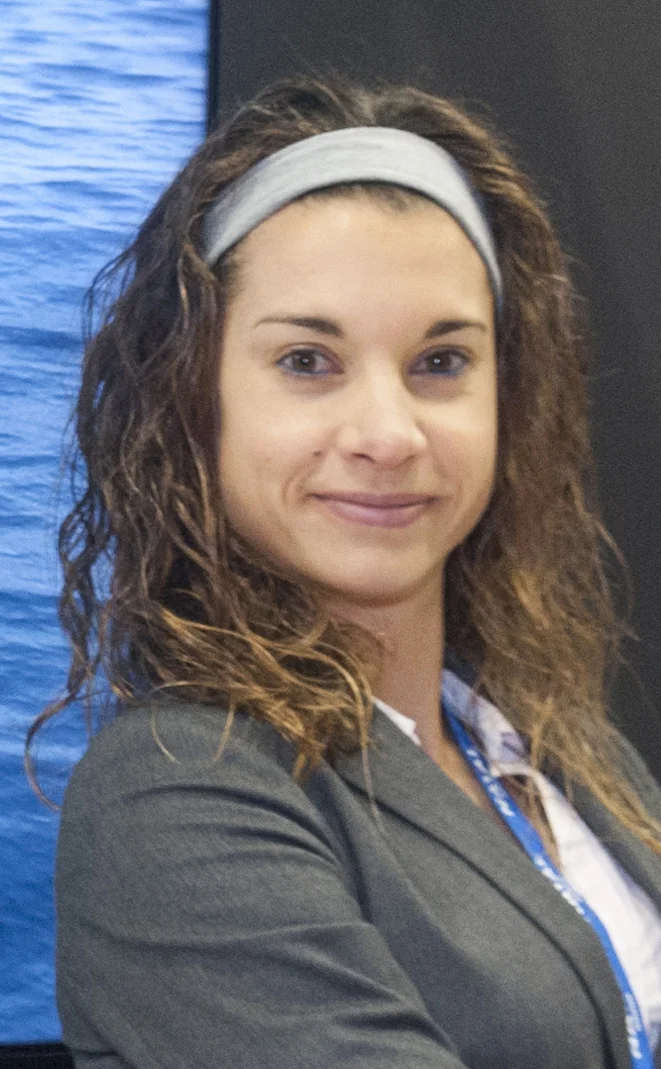Alexis Blasselle
Alexis Blasselle. Photo provided by Alexis.
Alexis (silent -s) designs warships. Always has done. As a child she covered pages with colourful drawings of them. But, unlike any of the other women I’ve portrayed to date, she was a failure at school which is hard to imagine when chatting with this extremely articulate, vivacious, sporty young woman whose mind works as fast as quicksilver.
“I come from a very working-class area of Marseilles; my school was in a priority education zone, in other words there was a high failure rate at the baccalaureate, and as I also went through a real adolescent crisis I only just scraped into the last two years of school.” But that was when a maths teacher saw the girl’s potential “and utterly inspired me to study mathematics.”
““My colleagues have less confidence in me, but the advantage is that it forces me to be excellent””
Nobody in her entourage, including the teachers, knew about “prepas” [see glossary] so she went to university to study maths. Within the first few weeks she heard about these maths-intensive “prepas” which appealed to her much more than her university course. But it was December and applications to these extremely selective lycées had been closed for six months. Unperturbed, she made an appointment with the headmaster of the Lycée Thiers in Marseilles and finally wore him down with her begging and pleading. She was in!
“And then came the time to sit these competitive exams that I approached entirely stress-free because I was only mildly interested in the outcome given that I was planning to return to university. In addition, my family knew nothing about the different schools so weren’t piling the pressure on.” She got a place at the top engineering school of them all in France: Polytechnique (see glossary). “So I thought I should probably go there!” she says disarmingly.
She concedes that in the first few weeks “I was completely lost. Most of my fellow students came from upper middle-class backgrounds and had been to the best lycées in France so there was a bit of a cultural gap.” She laughs when she recalls her disbelief that some of her classmates had first met through boy scouts which she thought were a thing of the 19th century!
But as everyone is grouped into sports sections — she was in judo — and as she got acclimatised, the gap narrowed.
At the end of the four-year course Alexis decided to return to university to study for a PhD in mathematics which she earned in 2011. “My thesis [in mathematics applied to model physical and biophysical systems] is the thing that I’m most proud of so far,” she says, recounting matter-of-factly how she had to supplement her meagre income as a research assistant by waitressing in a bar at night. She loved teaching so took some private students as well. One of the fathers worked for Bouygues and offered her a job in Australia in 2012 once she’d decided that she wanted to earn more money than she would ever get as a maths researcher.
“Oh my goodness what misogyny I came across in the outback of Queensland!” she shudders. She spent 18 months there working on a project to rebuild a road with the least environmental and societal impact possible so spent a lot of time deciding with the Aboriginal owners of the land where the road could pass. “I had no trouble with them at all, but with the red-neck Australians,” she says.
Bouygues then sent her back to France as deputy director of a site at Clermond-Ferrand where she had to coordinate the work. “I’ve never worked so hard in my life but I really loved working in a team and earning good money.”
But something was missing: water. “I grew-up by the sea, in the water all the time, so when I looked for a large company involved in naval systems where I could work in a team then Naval Group seemed like an obvious choice. I applied for a job in 2014 and was offered one as a naval architect. I’ll never forget what my boss told me at the time 'We’ll throw you in at the deep-end and see if you know how to swim!'”
She clearly does. A naval architect is like the conductor of an orchestra of about 15 people. She’s the only woman amongst some 40 naval architects but has not come across any outright misogyny, “just accidental, such as when someone walks into a room where I am and says “good morning gentlemen”, but that is incomparable with what I came across in the civil engineering sector where you had to counter outright sexist remarks using subtlety, humour and derision.”
She has, however, noticed that “when I put forwards an idea I must provide formal proof to back it up” and that, a priori, “my colleagues have less confidence in me, but the advantage is that it forces me to be excellent.”
A young divorcee with no children “except for a tiny start-up called Tek Diving for which I provide mathematical formulae,” she grins, she spends whatever time is left over after work and sports “doing all those boring but necessary tasks that my older colleagues’ wives do for them, shopping, cooking, cleaning, laundry.” Whatever the future holds in her personal life, she is quite clear that in 20 years time “I hope I'll still be with Naval Group.”




